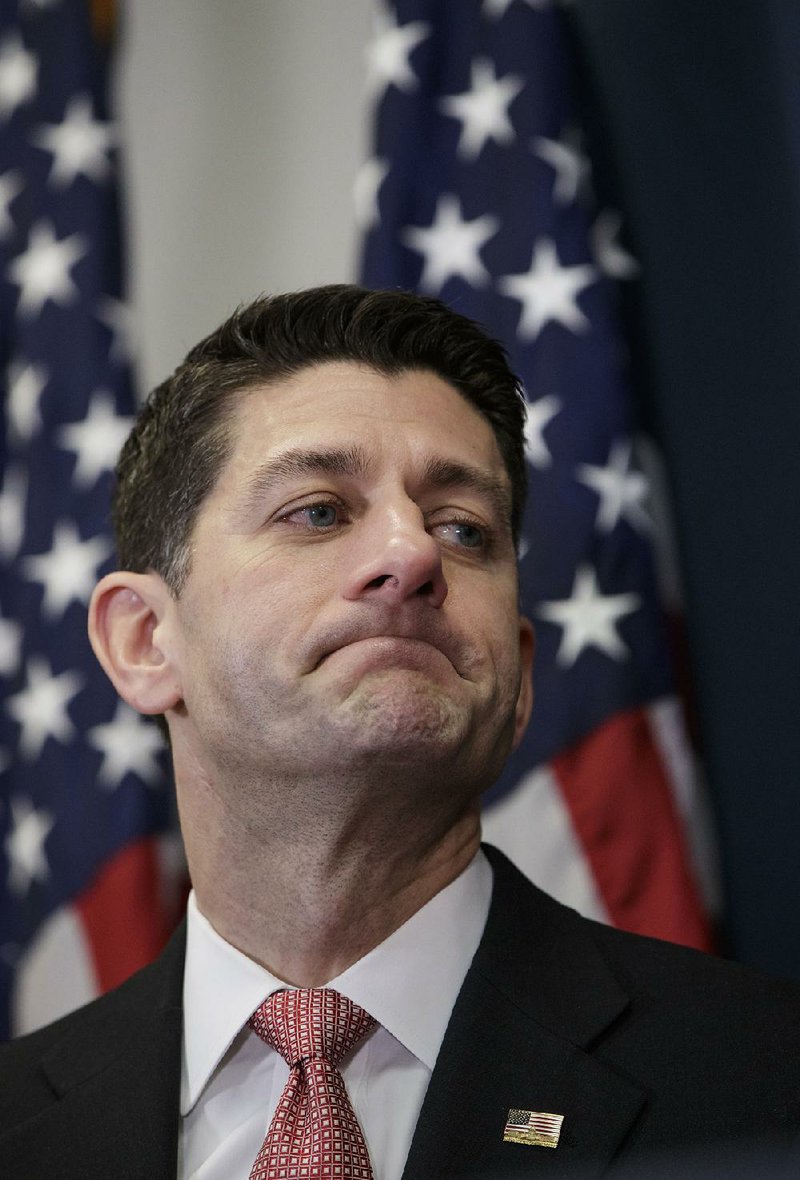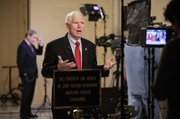WASHINGTON -- House Republican leaders and the White House, under pressure from conservative activists, have restarted negotiations on GOP legislation to repeal the Patient Protection and Affordable Care Act.
President Donald Trump and House Speaker Paul Ryan, R-Wis., decided Friday to pull the GOP's health care legislation because of lack of support for it in the House. Democrats said late Friday that they were breathing a sign of relief.
Subsequently, Trump said he was moving on to other matters, but senior White House officials are now saying they hope they can still get a vote on health care legislation.
"We're not going to retrench into our corners or put up dividing lines," Ryan said after a meeting of House Republicans that was dominated by a discussion of how to restart the health negotiations. "There's too much at stake to get bogged down in all of that."
[PRESIDENT TRUMP: Timeline, appointments, executive orders + guide to actions in first 100 days]
Republican lawmakers, conservatives and moderates alike, emerged from Tuesday's meeting saying there was a consensus to address the issue again, preferably soon. The private meeting lasted nearly two hours, causing Ryan to delay a planned news conference.
The House Republican whip, Steve Scalise of Louisiana, said of Democrats, "Their celebration is premature. We are closer to repealing Obamacare [the Affordable Care Act] than we ever have been before."
After Tuesday's meeting, Rep. Mo Brooks, R-Ala., said that unless the issue is revisited in a month, he would force the House to vote on a bill that goes further than Ryan's derailed measure in repealing the 2010 law.
Brooks is a member of the conservative House Freedom Caucus, which mostly opposed the GOP bill, saying it didn't go far enough in erasing former President Barack Obama's health care statute.
"We'll find out who is truly for repeal of Obamacare and who is not," Brooks said.
Trump, during a reception Tuesday night for Republican and Democratic senators and their spouses at the White House, predicted that a deal on health care will happen "very quickly."
"I know that we're all going to make a deal on health care. And that's such an easy one," he said, adding that he sees potential for working with Democrats on other issues, such as infrastructure. "Hopefully it'll start being bipartisan. Because everybody really wants the same thing: We want greatness for this country that we love."
It is not clear what political dynamics may have changed since Friday, when a coalition of hard-line conservatives and more moderate Republicans torpedoed the GOP legislation. The bill would leave 24 million more Americans without insurance after a decade, a major worry for moderate Republicans. It would also leave in place regulations on the health insurance industry, which conservatives oppose.
Ryan declined to say what might be in the next version of the Republicans' health care bill or provide any schedule for action on it. But he said Congress needs to act because insurers are developing the premiums and benefit packages for health plans they will offer in 2018, and review by federal and state officials begins soon.
The new talks, which have been going on quietly this week, involve Steve Bannon, the president's chief strategist, and members of the two Republican factions that helped sink the bill last week, the hard-right Freedom Caucus and the more centrist Tuesday Group.
Any deal would require overcoming significant differences about how to rework a law that covers about one-fifth of the U.S. economy.
Revising the issue
Republican members of Congress said they hope that revisiting the issue will lead this time to a solution and a vote in the House.
The leader of the Freedom Caucus, Rep. Mark Meadows, R-N.C., said his group is talking to moderate Republicans.
"Obviously everybody wants to find a way to get this passed, and we're going to work real hard to do that," said Meadows.
"I think everyone wants to get to yes and support President Trump," said Rep. Dave Brat, R-Va., a Freedom Caucus member. "There is a package in there that is a win-win."
Trump has sent mixed signals in recent days, at times blaming the Freedom Caucus, outside groups and even, it appeared, Ryan, for the bill's lack of support Friday. On Monday, for instance, he said in a late-night Twitter post that the Freedom Caucus was able to "snatch defeat from the jaws of victory" on the health care bill. "After so many bad years they were ready for a win!"
But then he suggested that he could cut a deal with Democrats, a move that would almost certainly make more conservative members of the House balk. "Don't worry," he tweeted later Monday night, "we are in very good shape!"
Ryan, when asked if he saw any signs that members of the House Freedom Caucus might be willing to compromise, said: "I don't want us to become a factionalized majority. I want us to become a unified majority, and that means we're going to sit down and talk things out until we get there, and that's exactly what we're doing."
"We saw good overtures from those members from different parts of our conference to get there because we all share these goals, and we're just going to have to figure out how to get it done," Ryan said.
Democrats took formal steps to get involved in what they called improving the Affordable Care Act. Rep. Nancy Pelosi of California, the Democratic leader, sent a letter to House Democrats calling for suggestions in ways to make the health law work better.
"We can then discuss these suggestions in our caucus and be prepared at the earliest possible time to go forward," she said.
The Senate GOP's No. 2 leader, John Cornyn of Texas, showed little appetite for plunging ahead.
"My hope is that Democrats will quit gloating at our inability to get it done on a party-line basis and join us in fixing" Obama's law, Cornyn said. He said he didn't expect that to happen until "our Democratic friends have to start answering to the people who are being hurt by the failures of Obamacare."
Senate Minority Leader Charles Schumer, D-N.Y., said Democrats will address the health care law's overhaul only when Republicans drop their effort to repeal it. He accused Trump of using executive actions to destabilize the health care system. "That's not presidential," he said, "that's petulance."
Obama's health care law has provided insurance to 20 million additional people and forced insurers to provide better coverage to many more, but it's also left some markets with soaring premiums and fewer insurers.
Spending legislation
The health care strategizing comes as Congress is fast approaching next month's deadline to pass spending legislation or face a governmentwide shutdown. In the past, such deadlines have prompted brinkmanship that sometimes led to shutting down agencies.
Trump has proposed immediate budget cuts of $18 billion from programs like medical research, infrastructure and community grants so U.S. taxpayers can cover the down payment on his border wall.
The White House documents would wrap up $1.1 trillion in unfinished spending bills and address the Trump administration's request for an immediate $30 billion in additional Pentagon spending.
The latest Trump proposal, disclosed Tuesday, would eliminate $1.2 billion in National Institutes of Health research grants. The community development block grant program would be halved, amounting to a cut of $1.5 billion, and Trump would strip $500 million from a popular grant program for transportation projects.
Trump's administration asked earlier for $3 billion to pay for the U.S.-Mexico border wall and other immigration enforcement plans. During the campaign, Trump repeatedly promised that Mexico would pay for the wall, a claim the country has disputed.
"The administration is asking the American taxpayer to cover the cost of a wall -- unneeded, ineffective, absurdly expensive -- that Mexico was supposed to pay for, and he is cutting programs vital to the middle class to get that done," Schumer said. "Build the wall or repair or build a bridge or tunnel or road in your community? What's the choice?"
According to new details sent to Congress, the administration wants immediate funds to complete an existing barrier in the Rio Grande Valley, $500 million to complete 28 miles of border levee wall near McAllen, Texas, and $350 million for construction along two segments near San Diego.
Other cuts include $434 million to immediately eliminate a program to encourage community service opportunities for senior citizens, eliminating $372 million in remaining funding for heating subsidies for the poor, and cutting $447 million in transit grants.
White House budget office spokesman John Czwartacki said the proposals were not being shared with the media. A Capitol Hill aide described the cuts, speaking only on condition of anonymity because the budget document is not yet public.
The roster of cuts was sent to Capitol Hill as a set of options for GOP staff aides and lawmakers crafting a catchall spending bill for the budget year, which ends Sept. 30.
Those talks are intensifying, but Senate Republicans are considering backing away from a showdown with Democrats over whether to fund Trump's request for immediate money to build a wall along the U.S.-Mexico border. Senate Democrats have threatened to filibuster any provision providing money for the wall.
Many Republicans aren't very enthusiastic about the wall and say the White House hasn't given them many specifics to go on.
"I'd like to hear the details. What is this wall?" asked Sen. John McCain, R-Ariz.
Asked about including Southern border wall financing in the broader spending package, Sen. Roy Blunt, R-Mo., a key negotiator, said: "They will not pass together. That's just my view."
Blunt added, "My view is there's a path to get 60 votes" in the Senate, the total required to overcome a Democratic filibuster. Blunt is a member of the Senate GOP leadership team and a major player on health and human services accounts.
Without successful action on spending, the government will shut down except for some functions at midnight April 28.
Negotiators have made progress on the core elements of a dozen must-do funding bills, but have ignored the White House's list of cuts in doing so.
Information for this article was contributed by Robert Pear, Jeremy W. Peters, Maggie Haberman of The New York Times; and by Alan Fram, Erica Werner, Kevin Freking and Andrew Taylor of The Associated Press.
A Section on 03/29/2017

